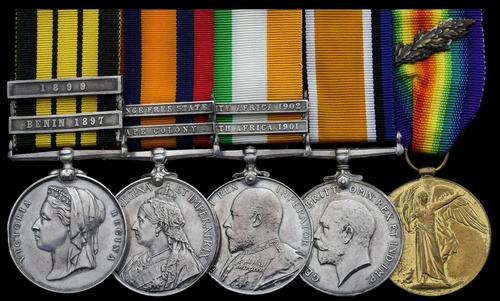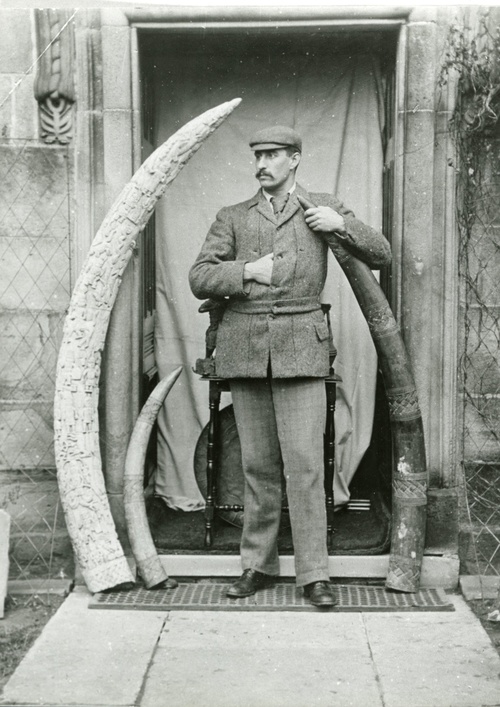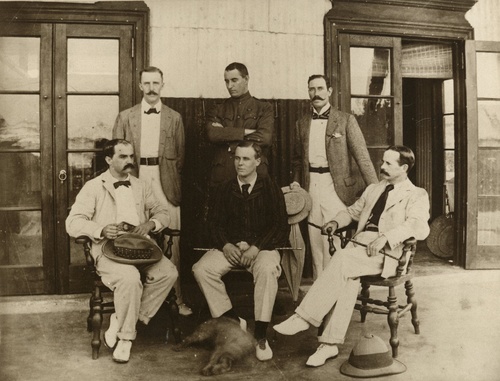Auction: 19003 - Orders, Decorations and Medals
Lot: 174
A notable Benin operations, Boer War and Great War campaign group of five awarded to Major N. Burrows, South Wales Borderers, late Loyal North Lancashire Regiment
Attached to the Niger Coast Protectorate as an Acting Vice-Consul and District Commissioner in the period 1895-99, he served as a volunteer in the Benin City operations of 1897, gaining a brace of 'mentions' for his valuable reconnaissance work and command of the leading Maxim in Admiral Rawson's force; a third 'mention' followed for the risks he undertook in the subsequent Benin operations of 1899, among them the capture of an enemy camp
On his retirement in May 1909, Burrows took up post as Deputy Governor of Pentonville Prison, where subsequent 'guests' included some notorious murderers of the era, among them Dr. Hawley Crippen, who was executed at the prison during his term in office
East and West Africa 1887-1900, 2 clasps, Benin 1897, 1899 (Lieut. N. Burrows, Loyal N. Lancs. Regt.); Queen's South Africa 1899-1902, 2 clasps, Cape Colony, Orange Free State (Major N. Burrows, S. Wales Bord.); King's South Africa 1901-02, 2 clasps, South Africa 1901, South Africa 1902 (Major N. Burrows, S. Wales Bord.); British War and Victory Medals with M.I.D. oak leaves (Major N. Burrows), generally very fine (5)
Norman Burrows was born on 15 October 1868 and educated at Sedbergh School, Cumbria. Commissioned 2nd Lieutenant in the Loyal North Lancashire Regiment in January 1891, direct from the Militia, he embarked with the 1st Battalion for India and was advanced Lieutenant in October 1892; he was fortunate to emerge unscathed from the 'Nagpur Railway Disaster' in November 1891, when 11 men from the Battalion were killed.
Niger Coast Protectorate 1895-99
Appointed an Acting Vice-Consul in the protectorate in February 1895, Burrows undertook administrative and judicial duties over 'a very large area'; his CV, refers.
More notable, however, was his good work in the Benin operations of 1897, when, as a volunteer in the Niger Coast Protectorate Force, he came to the notice of Rear-Admiral Harry Rawson for reconnaissance work:
'Captain Burrows, who, with Captain Cockburn, ascertained the nature of the country between Ceri and Ologbo Beach, on both sides of the creek' (London Gazette 7 May 1897, refers).
A more informative account of that valuable work is to be found in a related report submitted by Lieutenant-Colonel Bruce Hamilton:
'I take this opportunity of mentioning here the very excellent work done by Messrs. Burrows and Lyon in this district during a most trying and anxious time. They have both acted with great energy and tact in most difficult circumstances. Mr. Burrows has done most useful work in surveying the water approaches to Ikuru and Ologbo. Before I arrived, and a few days after the facts of the expedition were known, he took a few men with him and burnt Ologbo.'
Moreover, as Rawson's force closed the outskirts of Benin in February 1897, Burrows was again cited for his good work by Hamilton:
'Captain Burrows, who worked the leading Maxim throughout most creditably and was often in positions of considerable danger' (London Gazette 7 May 1897, also refers).
His brace of 'mentions' aside, Burrows was specially promoted to Captain in the South Wales Borderers and given a Brevet Majority.
Returning to his administrative and judicial duties, and having been appointed a District Commissioner in 1898, Burrows was next actively engaged in the Ologbo Sheri operations of 1900, when he was mentioned in despatches for a third time, for his 'exceptional zeal' as a column leader, and for undertaking risks which his position did not require him to take (London Gazette 14 September 1900, refers).
A glimpse of such risks may be found in a report submitted by Burrows in May 1899, not least an operation he mounted against an enemy camp near Obuiho on the 4th:
'Taking 12 men, I myself proceeded in search of one of the enemy's camps, which I found to be close to the town. I surprised the camp, and after having one shot, which wounded a man, reported to Obohun's headman … I rushed in and captured two other men, six guns and a pistol. The remaining three who were in the camp and got away, were afterwards brought in.'
The Boer War
Burrows relinquished his position in late 1899, the advent of hostilities in South Africa necessitating his deployment as a District Commandant. He duly served in that capacity until September 1902, at Queenstown, Burghersdorp, Modder River and Boshof (Queen's Medal & 2 clasps; King's Medal & 2 clasps); following a period of leave, he returned to South Africa in 1903, as a Special Commissioner on the Compensation Board.
Back home, he was attached to the Army Service Corps 1904-6, prior to being appointed Adjutant of the 1st (Volunteer) Battalion of the Border Regiment in April of the latter year.
Prison Governor
Placed on the Retired List in May 1909, Burrows took up the office of Deputy Governor of Pentonville Prison in the same month.
The prison had taken over the role as north London's execution centre on the closure of Newgate in 1902, in addition to inheriting the role as a training centre for future executioners. In consequence, in his term of office from May 1909 until the outbreak of the Great War, Burrows would have witnessed the execution of several notorious murderers, among them Dr. Hawley Crippen, who was executed there in October 1910.
Two years later he made an unsuccessful application for the post of Chief Constable of West Sussex.
The Great War and beyond
Soon after the outbreak of hostilities in August 1914, Burrows was appointed to the command of the 7th Battalion, Loyal North Lancashire Regiment, in which capacity he served until taking up duty as a Railway Transport Officer, graded as Staff Captain, in May 1915.
Advanced to Major in September of the same year, he subsequently served as Assistant Provost Marshal to 62nd Division in the period March to August 1916, prior to returning to regimental employ in the 3rd Battalion, South Wales Borderers at the year's end; accompanying research suggests that he returned to Provost Marshal duties before the war's end.
Placed on the Reserve of Officers in July 1919, Burrows took up office as the Governor of Wakefield prison, Yorkshire, where he died at his residence in October 1922.
Sold with a large file of copied research, including official correspondence and reports, together with a host of glowing testimonials submitted on his application for the post of Chief Constable of West Sussex in the summer of 1912.
Subject to 20% VAT on Buyer’s Premium. For more information please view Terms and Conditions for Buyers.
Sold for
£850
Starting price
£550









